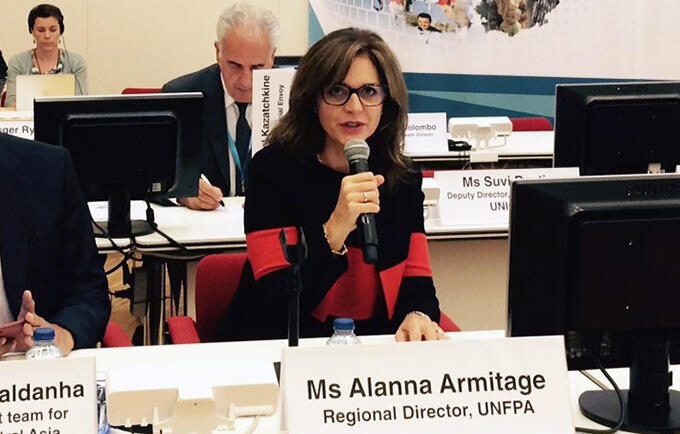COPENHAGEN – The adoption last week of a European action plan for sexual and reproductive health was welcomed by UNFPA, which provided advocacy, technical, and coordination support to the action plan’s development.
‘Adoption of this action plan is a significant step forward for the region and will be an inspiration to the rest of the world,’ Alanna Armitage, Director of UNFPA’s Regional Office for Eastern Europe and Central Asia, said at the 66th session of the World Health Organization (WHO) Regional Committee for Europe, where the plan was adopted.
‘The WHO European Region is seen as a leader on advancing sexual and reproductive health and rights,’ Armitage added. ‘This action plan will ensure that all individuals can exercise their basic human rights, including those related to the most intimate and fundamental aspects of life.’
Health ministers and high-level representatives from the 53 countries in the WHO European Region gathered along with partner organisations and civil society to debate a set of innovative action plans that affect public health as part of the 66th session, held 12 to 15 September in Copenhagen. The overarching theme of the session was the central role of health in ‘leaving no one behind’ as countries embark on implementing the 2030 Agenda for Sustainable Development.
The eight strategies and action plans presented and adopted at the session call for accelerated action and stronger political commitment on refugee and migrant health, women’s health, sexual and reproductive health, non-communicable diseases, HIV/AIDS, viral hepatitis, integrated health services, and the use of data in public health.
UNFPA supported WHO and member states of the Eastern Europe and Central Asia region with a consultation in March on the final draft of the sexual and reproductive health action plan. That consultation, held in Tbilisi, Georgia, ‘generated valuable inputs and strong support from the governments involved and ensured that their priorities were reflected’, Armitage said in her statement.
‘UNFPA is pleased that the action plan responds to the findings of the 20-year intergovernmental review of implementation of the Cairo ICPD Programme of Action which took place in 2014,’ Armitage said. ‘That review highlighted that our region still faces significant inequalities with respect to maternal and infant/under-five mortality, unmet need for contraception, high numbers of unsafe abortion and adolescent pregnancies, rising STIs and HIV, and cervical cancer.’
According to WHO, the new sexual and reproductive health action plan ‘focuses on both physical and mental aspects to improve health outcomes’ and ‘provides strategic directions for decision-makers’ in tackling new public-health challenges that arise in countries as their populations live longer and migration increases.
UNFPA’s Regional Office for Eastern Europe and Central Asia and the WHO Regional Office for Europe have been working together since 2014 to implement the first regional joint programme in sexual and reproductive health (SRH), facilitating evidence-based policy dialogue and sharing good practices and technical resources on priority SRH issues. UNFPA EECARO closely cooperated with WHO in the process of developing the action plan on sexual and reproductive health and in consultations within the framework of the regional joint programme.


